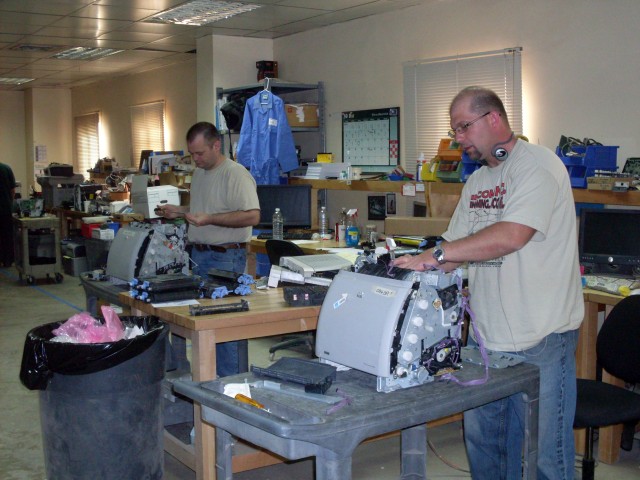TOBYHANNA ARMY DEPOT, Pa. - "You are what you repeatedly do," said Thomas Holmes, the Southwest Asia manager for Tobyhanna Army Depot.
"You have to do something over and over again to master it," he went on to explain. He was using this motto as an explanation of the training and daily operations that occur at Tobyhanna's Forward Repair Activity in Balad, Iraq. Most, if not all, of the 109 personnel that Holmes is responsible for came from their job with Tobyhanna in the states to learn new skills here and at the other Forward Operating Bases that Tobyhanna operates from. And one thing that is immediately noticeable in theater is that the Tobyhanna employees have to "step up their game - man up - there is no hiding here," as Holmes summarized.
Holmes has been in Iraq since February. He has been with Tobyhanna for 11 years, and the U.S. government for 30 years. He completed six years active duty in signal and computer repair and three years in the Army National Guard.
Holmes enjoyed reminiscing about the good old days when he was a teletype repairman in the Army. He said back then a hard drive could store anywhere from 1MB to 5MB of information. He said that the teletype machines that he serviced were so large and heavy that it took two men to pick them up. Today's hand-held computers store far more information and weigh far less than the old teletype machines with tape running out of them that Holmes worked on. Technology and the modern equipment of today's warfighter have certainly evolved.
"Everything is computerized today and software driven," Holmes noted.
"In an age where technology is an important part of how we do everything, it is surprising that the foe we are engaged with is not using technology," Holmes said.
This results in American forces having to be even more creative in their force protection measures.
Tobyhanna is part of this fight. Some of Holmes' biggest joys on the job stem from the direct impact that he and his fellow co-workers have on the Soldier. They recently fixed a server that was responsible for Soldiers getting ammunition. Tobyhanna also services lifesaving medical equipment as well as laptop and desktop computers, and printers.
Equipment arrives at Tobyhanna in three primary ways - walked in if local, convoyed in or mailed in. Tobyhanna also does "house calls" sometimes so that customers don't have to haul equipment to the Balad Tobyhanna facility.
There are many Tobyhanna employees embedded with units. They are referred to as Field Service Representatives (FSRs) and they support Soldiers in the field.
Speaking of his assigned personnel being dispersed throughout Iraq prompted Holmes to mention that he takes accountability of his assigned personnel very seriously and that he considers it his number one responsibility.
He oversees 11 programs under the direction of seven different site leads. Fred Teufert, Balad site lead, arrived in Iraq in May 2008 and has been employed by Tobyhanna since November 2007.
He felt a tour in Iraq would help his career and while learning more about logistics and leadership.
"We help everybody; Soldiers are our priority," Teufert said.
Tobyhanna Army Depot is the Defense Department's largest center for the repair, overhaul and fabrication of a wide variety of electronics systems and components, from tactical field radios to the ground terminals for the defense satellite communications network. Tobyhanna's missions support all branches of the Armed Forces.
About 5,600 personnel are employed at Tobyhanna, which is located in the Pocono Mountains of northeastern Pennsylvania.
Tobyhanna Army Depot is part of the U.S. Army CECOM Life Cycle Management Command. Headquartered at Fort Monmouth, N.J., the command's mission is to research, develop, acquire, field and sustain communications, command, control computer, intelligence, electronic warfare and sensors capabilities for the Armed Forces.


Social Sharing